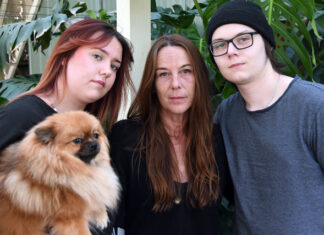By Melissa Meehan
IT’S a tight squeeze.
Three families living under the one roof just to make ends meet.
It might seem like the perfect storyline for the next popular sitcom, but for many families living in Cardinia and Casey it’s a harsh reality.
Even those who can afford to pay the rent are often left short when it comes to buying food or paying electricity, gas or phone bills.
With the financial pressures come a ripple affect of domestic violence, poverty and homelessness.
Jeni Mathieson from emergency crisis support service 4Cs in Pakenham knows these kinds of stories all too well.
“These are interesting times,” Ms Mathieson said.
“With utility prices up considerably and the rental prices definitely increasing, many people are struggling.”
Ms Mathieson said she expected the need for services like 4Cs to grow as the carbon tax is introduced.
“We have aged people in our shire who are renting and the rising rents are making them struggle to buy food.
“Those on Centrelink have not had enough increases to cover the cost of everything,” she said.
“One of the main concerns is to keep a roof over clients’ heads because if they lose their rental it can be very hard to find another.
“We actually have some clients with three families sharing one house just so they can keep a roof over their heads.”
According to the Office of Housing, the median rent for a three-bedroom house, the most frequently rented property in Pakenham, is $300 a week.
That means people on an average wage would be spending almost half their pay on rent.
Jan Donaldson, manager of Windermere’s Housing Support Program, said there was no doubt in her mind that families in Casey and Cardinia were struggling.
“What we have seen over the last few years is people moving out of Casey and moving into Cardinia because the rent is, on average, $40 cheaper,” she said.
“But in some cases these families are increasing their costs because they might need a second car or they are moving away from their support networks.”
Ms Donaldson said paying $40 less a week makes a huge difference for those who are already struggling to survive.
“It’s a complex issue with many ripple affects,” she said.
“But we have noticed that years ago people were paying 30 per cent of their combined income on rent or mortgage repayments.
“Now it’s more like 50 per cent – that’s one person’s full wage.
“That means if mum or dad loses their job they can no longer afford both the repayments and other everyday needs.”
She said her colleagues had spoken to people who were putting in 40-50 applications for rental properties and were still looking.
And she said others only asked for help when they were seriously at risk of being homeless.
“When families come to us or are talking to us it’s because they are at risk of homelessness,” she said.
“They haven’t paid the rent because they paid an electricity bill or they didn’t want their kids to miss out on something.
“People need to ask for help when they start to feel the strain, not just when they are in too deep.”
For more on the rental strain, see pages 7, 8 and 9.
Crammed in
Digital Edition
Subscribe
Get an all ACCESS PASS to the News and your Digital Edition with an online subscription
Grieving mother criticises detectives after son’s death
A grieving Pakenham mother says police investigative interviews were not handled in a trauma-informed way, adding further distress to an already “broken” family and...







